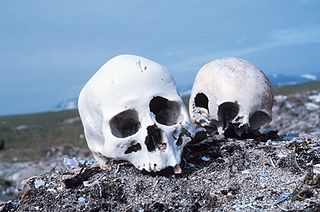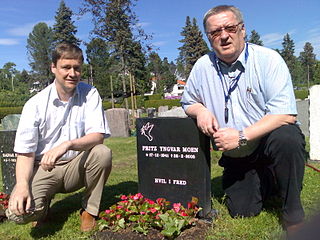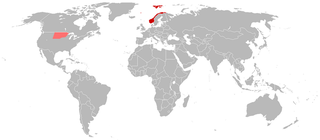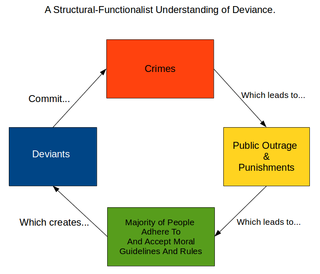The insanity defense, also known as the mental disorder defense, is an affirmative defense by excuse in a criminal case, arguing that the defendant is not responsible for his or her actions due to an episodic or persistent psychiatric disease at the time of the criminal act. This is contrasted with an excuse of provocation, in which defendant is responsible, but the responsibility is lessened due to a temporary mental state. It is also contrasted with a finding that a defendant cannot stand trial in a criminal case because a mental disease prevents them from effectively assisting counsel, from a civil finding in trusts and estates where a will is nullified because it was made when a mental disorder prevented a testator from recognizing the natural objects of their bounty, and from involuntary civil commitment to a mental institution, when anyone is found to be gravely disabled or to be a danger to themselves or to others.

Forensic science is the application of science to criminal and civil laws, mainly—on the criminal side—during criminal investigation, as governed by the legal standards of admissible evidence and criminal procedure.

Forensic pathology is pathology that focuses on determining the cause of death by examining a corpse. A post mortem is performed by a medical examiner, usually during the investigation of criminal law cases and civil law cases in some jurisdictions. Coroners and medical examiners are also frequently asked to confirm the identity of a corpse. Also see forensic medicine.
A coroner may conduct or order an inquest into the manner or cause of death, and investigate or confirm the identity of an unknown person who has been found dead within the coroner's jurisdiction.
A pardon is a government decision to allow a person to be absolved of guilt for an alleged crime or other legal offense, as if the act never occurred. The pardon may be granted before or after conviction for the crime, depending on the laws of the jurisdiction.

The High Court of Justiciary is the supreme criminal court in Scotland. The High Court is both a trial court and a court of appeal. As a trial court, the High Court sits on circuit at Parliament House or the former Sheriff Court building in Edinburgh, or in dedicated buildings in Glasgow and Aberdeen. The High Court sometimes sits in various smaller towns in Scotland, where it uses the local sheriff court building. As an appeal court the High Court sits only in Edinburgh.
Forensic psychology is the intersection between psychology and the justice system. It involves understanding fundamental legal principles, particularly with regard to expert witness testimony and the specific content area of concern, as well as relevant jurisdictional considerations in order to be able to interact appropriately with judges, attorneys, and other legal professionals. An important aspect of forensic psychology is the ability to testify in court as an expert witness, reformulating psychological findings into the legal language of the courtroom, providing information to legal personnel in a way that can be understood. Further, in order to be a credible witness, the forensic psychologist must understand the philosophy, rules, and standards of the judicial system. Primarily, they must understand the adversarial system. There are also rules about hearsay evidence and most importantly, the exclusionary rule. Lack of a firm grasp of these procedures will result in the forensic psychologist losing credibility in the courtroom. A forensic psychologist can be trained in clinical, social, organizational, or any other branch of psychology.

Forensic accounting, forensic accountancy or financial forensics is the specialty practice area of accounting that describes engagements that result from actual or anticipated disputes or litigation. "Forensic" means "suitable for use in a court of law", and it is to that standard and potential outcome that forensic accountants generally have to work. Forensic accountants, also referred to as forensic auditors or investigative auditors, often have to give expert evidence at the eventual trial. All of the larger accounting firms, as well as many medium-sized and boutique firms and various police and government agencies have specialist forensic accounting departments. Within these groups, there may be further sub-specializations: some forensic accountants may, for example, just specialize in insurance claims, personal injury claims, fraud, anti-money-laundering, construction, or royalty audits.

A sheriff court is the principal local civil and criminal court in Scotland, with exclusive jurisdiction over all civil cases with a monetary value up to £100,000, and with the jurisdiction to hear any criminal case except treason, murder, and rape which are in the exclusive jurisdiction of the High Court of Justiciary. Though the sheriff courts have concurrent jurisdiction with the High Court over armed robbery, drug trafficking, and sexual offences involving children, the vast majority of these cases are heard by the High Court. Each court serves a sheriff court district within one of the six sheriffdoms of Scotland. Each sheriff court is presided over by a sheriff, who is a legally qualified judge, and part of the judiciary of Scotland.

The courts of Scotland are responsible for administration of justice in Scotland, under statutory, common law and equitable provisions within Scots law. The courts are presided over by the judiciary of Scotland, who are the various judicial office holders responsible for issuing judgments, ensuring fair trials, and deciding on sentencing. The Court of Session is the supreme civil court of Scotland, subject to appeals to the Supreme Court of the United Kingdom, and the High Court of Justiciary is the supreme criminal court, which is only subject to the authority of the Supreme Court of the United Kingdom on devolution issues and human rights compatibility issues.

The Scottish Criminal Cases Review Commission (SCCRC) is an executive non-departmental public body of the Scottish Government, established by the Criminal Procedure (Scotland) Act 1995.
Law enforcement in Sweden is carried out by several government agencies, under the guidance of the Government of Sweden.

Berthold Grünfeld was a Norwegian psychiatrist, sexologist, and professor of social medicine at the University of Oslo. He was also a recognized expert in forensic psychiatry, often employed by Norwegian courts to examine insanity defense pleas.

Fritz Yngvar Moen was a Norwegian man wrongfully convicted of two distinct felony murders, serving a total of 18 years in prison. After the convictions were quashed, an official inquiry was instigated to establish what had gone wrong in the authorities' handling of the case, and on 25 June 2007 the commission delivered harsh criticism to the police, the prosecution and the courts in what was immediately termed Norway's worst miscarriage of justice of all time.
The Ministry of Justice is a Cabinet-level ministry of the Government of Sweden which handles matters relating to the justice system, such as legislation concerning the constitution, as well as law enforcement and counter-terrorism procedures. All Swedish law enforcement agencies, as well as the prosecution authorities, the prison and probation service and the National Council for Crime Prevention answer to the Ministry of Justice. In addition to handling constitution-related legislation, the Ministry is responsible for legislation and procedures relating to administrative law, civil law, procedural law and criminal law. The Ministry also deals with matters relating to migration and asylum policy. Internationally, the Ministry of Justice takes part in efforts to co-operate with other nations in order to combat cross-border crime. It is located in the government chancellery Rosenbad in Stockholm.
The Judicial Investigation Department, is a unit of the Supreme Court of Justice of Costa Rica. Currently its director is Walter Espinoza.
A. W. Jones is a researcher and scholarly writer on the subject of forensic toxicology and human physiology relating to alcohol consumption. He holds three university degrees: BSc, PhD and DSc. Jones was born in Pontypridd, Wales, UK, but has lived and worked in Sweden for the past 45 years.

Tirath Das Dogra is an Indian forensic pathologist and former Pro-Chancellor and vice-chancellor of SGT University, Budhera Gurgaon Haryana 2013–2017. He is a former director of the All India Institute of Medical Sciences (AIIMS) New Delhi and an authority on forensic medicine. Dogra been member of the Medical Council of India from December 2013 till its dissolution in September 2018. Dogra have been President of National Medicos Organisation Delhi State from 2012 to 2017. Dogra was member of TEQ-Equivalence Committee and Administration and Grievance committee of Medical Council of India. He is member of Advisory committee on MOOC's program of University Grants Commission of India New Delhi. Presently he is emeritus professor of forensic medicine and forensic sciences, professor of Andragogy and educational philosophy and Advidsor, Internal Quality Assurance Cell (IQAC) at SGT University Gurgaon.

The National Forensic DNA Database of South Africa (NFDD) is a national DNA database used in law enforcement in South Africa. The Criminal Law Amendment Act No. 37 of 2013 provides for the expansion and administration of such a database in South Africa, enabling the South African Police Service (SAPS) to match forensic DNA profiles derived from samples collected at crime scenes with forensic DNA profiles of offenders convicted of, and suspects arrested for, offences listed in a new Schedule 8 of the amended Criminal Procedure Act of 1977.









